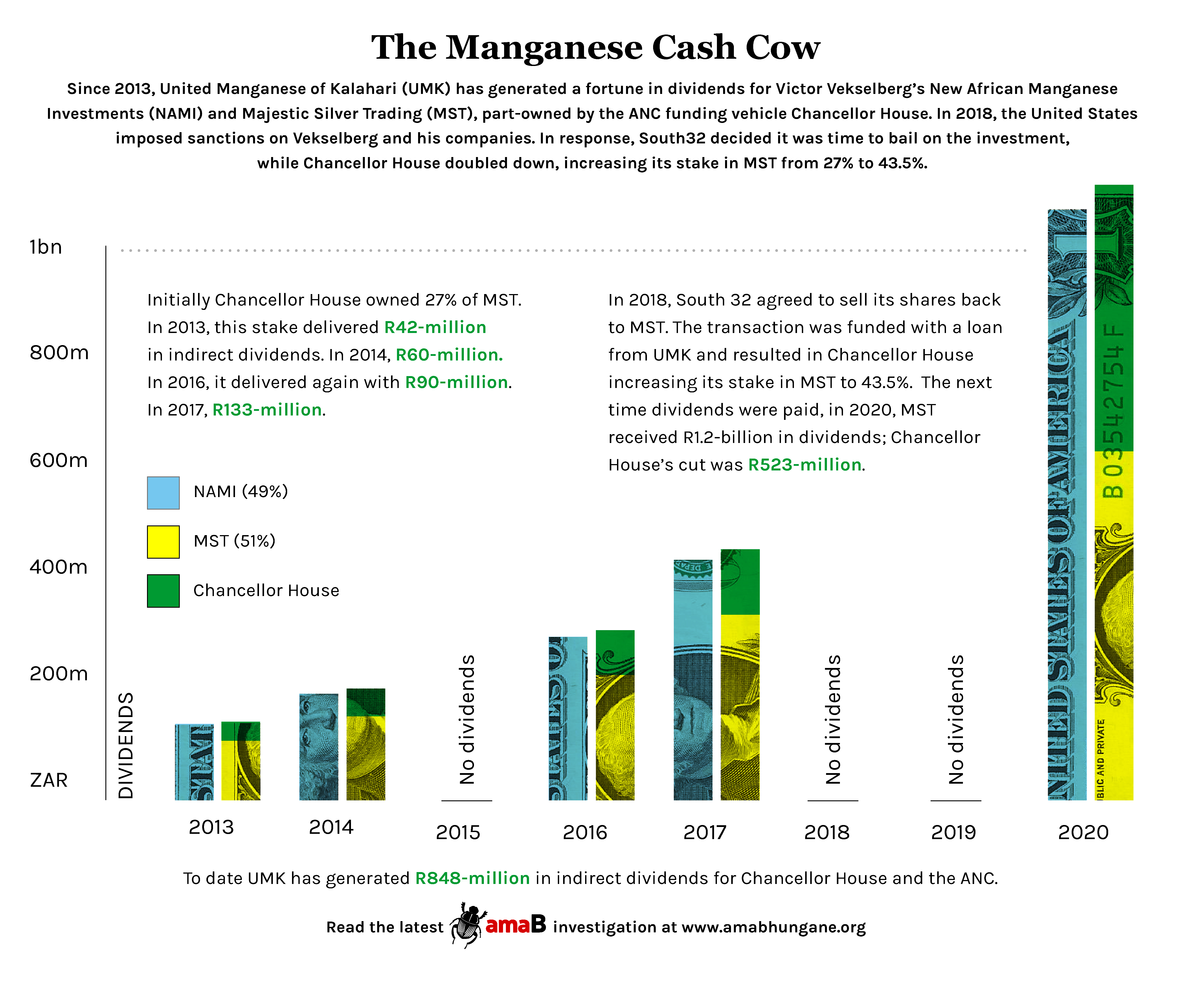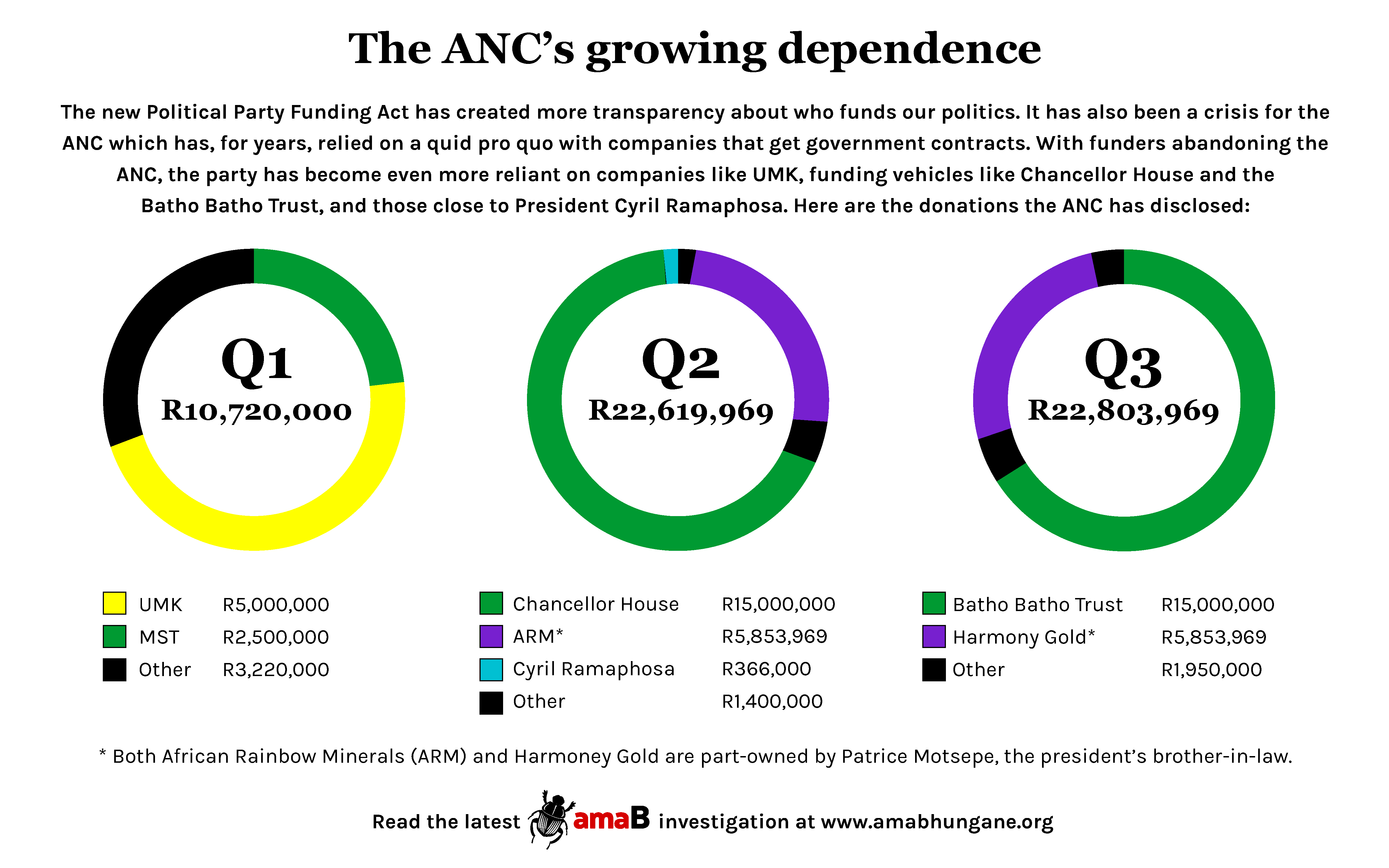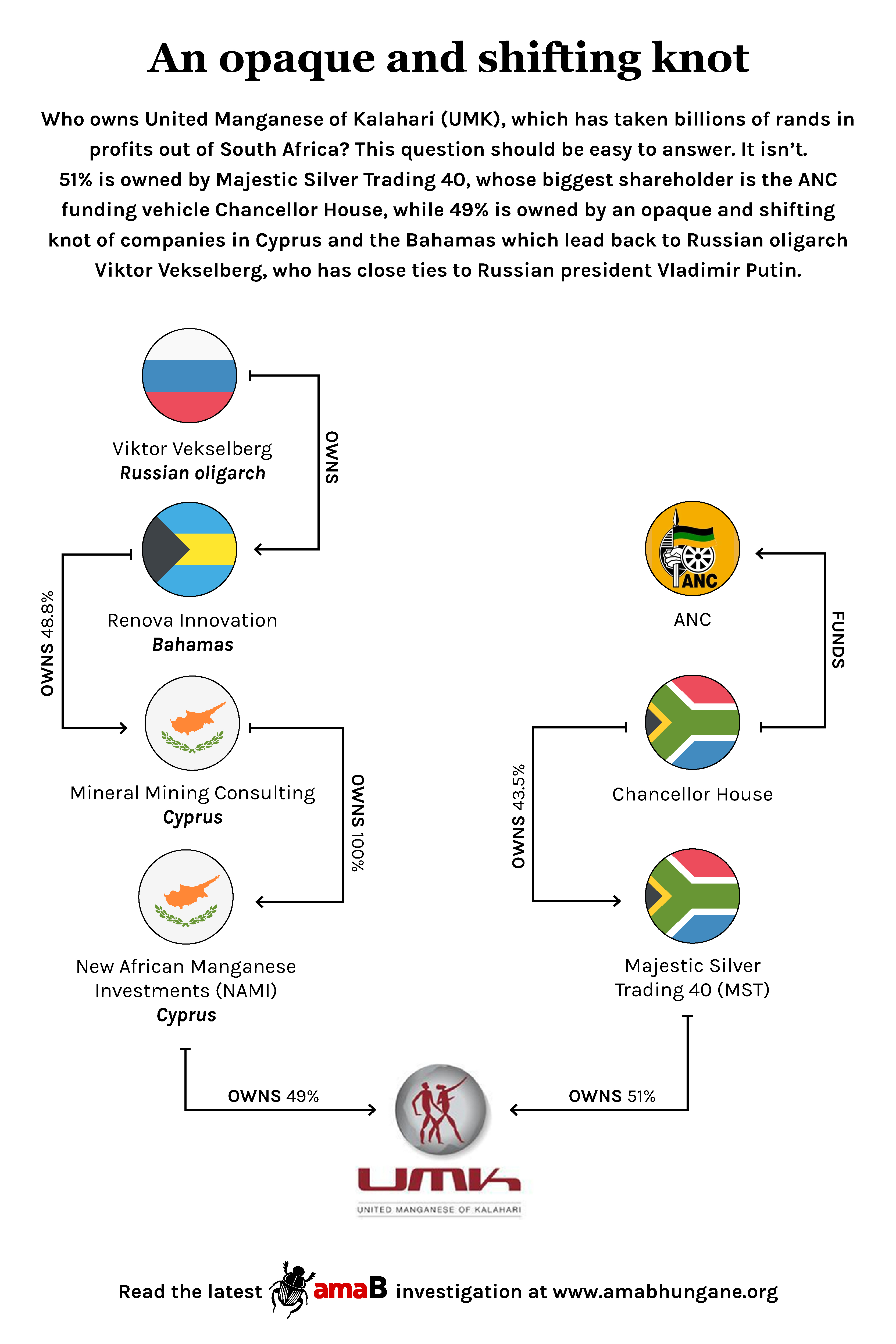AMABHUNGANE
ANC’s manganese ‘gold’ mine joint venture with sanctioned Russian oligarch

Massive cash flows from a joint venture with sanctioned Russian oligarch Viktor Vekselberg could overwhelmingly shape the ruling party’s financial fortunes. The scale of the party’s reliance on this single asset may begin to explain the ANC’s fawning position on Russia.
United Manganese of Kalahari (UMK) is set to become an unbridled cash cow for the ANC, especially its funding front Chancellor House. UMK’s riches and its Russian connections potentially create a strong motive for the party’s equivocation on the Russian invasion of Ukraine.
Financial records from Cyprus show that UMK paid out a staggering R2.4-billion in dividends in 2020 following a year of favourable manganese prices in 2019. Later financial reports are not yet available, but prevailing prices probably resulted in similar distributable profits in subsequent years.
Chancellor House’s indirect 22% share in the 2020 dividends would have amounted to R528-million. The windfall eradicated Chancellor House’s debt and helped it to increase its stake in the extremely profitable mining company by buying out another shareholder.
This means dividends, probably totalling hundreds of millions of rands in 2021 and beyond, will be unencumbered and can flow freely to the ANC’s largest declared funder.
These figures can be inferred from the publicly available accounts of the Russian half of the UMK joint venture, a Cyprus-registered entity called New African Manganese Investments (Nami) through which the Russian billionaire Viktor Vekselberg holds shares in UMK.
In 2018, Vekselberg and six other wealthy Russian oligarchs, perceived to be close to the Kremlin, were made Special Designated Nationals by the US government. Their assets in US jurisdictions were frozen and US persons that do business with them were also sanctioned.
The US applies a 50% rule as part of this system, meaning that any entity (globally) in which a designated person like Vekselberg has a 50% or larger interest also becomes designated.
 Nami owns 49% of UMK, an arrangement that seemingly allows UMK to avoid US sanctions targeting Vekselberg. UMK may, however, still be in danger. The US system targets companies owned “or controlled” by designated persons, meaning that forms of control other than via majority shareholding may still bring them within the US law’s ambit.
Nami owns 49% of UMK, an arrangement that seemingly allows UMK to avoid US sanctions targeting Vekselberg. UMK may, however, still be in danger. The US system targets companies owned “or controlled” by designated persons, meaning that forms of control other than via majority shareholding may still bring them within the US law’s ambit.
In March this year, following the invasion of Ukraine, the sanctions against Vekselberg and others were intensified, with his yacht and jet, together allegedly worth $180-million, being frozen. The yacht, a 2,000-tonne floating palace named Tango, is registered in the Cook Islands. After the freezing, the FBI went a step further and seized the superyacht in April.
These increasingly severe actions are a demonstration of what may befall other Vekselberg assets.
Zweli Mkhize’s race against time and the Special Investigating Unit
Life of the party?
The balance of 51% in UMK is owned by Majestic Silver Trading 40 (MST) which is a politically connected South African consortium including Chancellor House, Pitsa Ya Setshaba Holdings (PST) and a Kalahari community trust.
The spectacular 2020 dividends were used to fund the buyout of another MST shareholder, multinational mining group South32’s subsidiary Samancor Manganese. This transaction, which was worth R1.37-billion, was completed in two parts following the designation of Vekselberg.
First, UMK lent MST the money to buy out South32. Then, MST paid back that loan using the windfall dividend in 2020.
This resulted in Chancellor House and Pitsa both owning 43.5% of MST.
When asked whether the Vekselberg connection was the motivation for South32 selling its stake in the profitable venture to the other shareholders, spokesperson Miles Gregory said: “We don’t have anything further to add about the divestment at this stage.”
Chancellor House was identified as an ANC front in 2005 when it was rapidly striking deals in the mining and energy sectors, sometimes under questionable circumstances. Today it no longer makes any secret of its role. The sole shareholder of the company is the Chancellor House Trust and the ANC is a beneficiary of this trust.
What has escaped notice is the evidently enormous importance of UMK in the scheme of things. The scale of dividends revealed in the financial statements of Nami indicates that the ANC is unlikely to have any comparable dependable source of cash.
South Africa’s recent moves towards a more transparent political funding regime have already shown how Chancellor House and UMK fund the ANC.
In April last year, the Political Party Funding Act (PPFA) came into effect. This act created the (voluntary) quarterly disclosure of funders by political parties.
In the first three quarterly reports produced by the Electoral Commission (IEC), it was revealed that Chancellor House had donated R15-million to the ANC. This is the new legal maximum a single person or entity can donate to a party. UMK has, however, seemingly contributed more than this without falling foul of the donation limit by, for instance, splitting funds up through lots of small entities.
According to the IEC funding reports, UMK donated R5-million while MST donated a further R2.5-million.
This triple contribution seems to technically raise the potential annual donation from the UMK structure to R45-million, being R15-million each from Chancellor House, UMK and MST.
Mogopodi Mokoena, the managing director of Chancellor House and chairman of the UMK board, said there was nothing untoward about this:
“We have always been transparent regarding our donations, which are board decisions, as is the distribution of dividends. Once a dividend is declared, the shareholders can disseminate as they see fit.
“We are satisfied that we comply with the PPFA.”
The ANC did not respond to a request for comment.
 The party has other large benefactors, including Batho Batho, a trust with ANC roots that owns 46% of Thebe Investment, which in turn has minority stakes in Shell’s downstream operations in South Africa as well as Seriti, a major coal supplier to Eskom.
The party has other large benefactors, including Batho Batho, a trust with ANC roots that owns 46% of Thebe Investment, which in turn has minority stakes in Shell’s downstream operations in South Africa as well as Seriti, a major coal supplier to Eskom.
Batho Batho donated R15-million to the ANC too, but given the triple donation from Chancellor House, UMK and MST, the manganese mine is arguably the largest single source of declared funding for the governing party.
This makes the safety of the mine from US sanctions crucial, but at the same time means that the relationship with a supposed Kremlin insider is key to party finances.
Who’s the boss?
Mokoena claims that Vekselberg’s involvement is even less than Nami’s 49% shareholding implies. This suggests that UMK has nothing to fear from the “owning or controlling” trigger for US sanctions.
“Mr Vekselberg is the only shareholder defined as a Specially Designated National (SDN) under current US, EU and UK sanctions. He does not own any direct interest in UMK and is an economic beneficiary of a trust that owns less than 25% of UMK. His personal sanctions, therefore, do not affect UMK’s operations. Except for Mr Vekselberg, none of the other beneficial owners of MST and NAMI has been defined as SDNs or is subject to sanctions by the US, EU, or UK.”
The full shareholding structure of Nami is, however, an opaque and shifting knot, reflecting efforts to avoid the sanctions.
 Nami owns 49% of UMK. Nami is in turn wholly owned by a Cyprus company called Mineral Mining Consulting (MMC). MMC has three shareholders. The biggest one, with 48.8%, is Renova Innovation Technologies in the Bahamas, a Vekselberg company. If Mokoena’s claim is true then this is the only exposure Vekselberg has to UMK.
Nami owns 49% of UMK. Nami is in turn wholly owned by a Cyprus company called Mineral Mining Consulting (MMC). MMC has three shareholders. The biggest one, with 48.8%, is Renova Innovation Technologies in the Bahamas, a Vekselberg company. If Mokoena’s claim is true then this is the only exposure Vekselberg has to UMK.
“UMK has never been majority owned or controlled by Renova, and Nami itself is not controlled by Renova since restructuring in 2018,” said Mokoena.
Cyprus documents show that a reconfiguration of Nami’s shareholding only came about in February 2020. It resulted in the Cyprus company being 48.8% owned by Vekselberg – precisely what is necessary to avoid sanctions at that level.
Two other Cypriot shareholders, ABC Grandeservus and Tromata Consultants, now own 36% and 15%, respectively. Grandeservus is an opaque corporate administrator that holds assets for clients. It has in the past allegedly held other assets on behalf of Vekselberg, according to a 2019 ruling by the Eastern Caribbean Supreme Court in the British Virgin Islands.
The shareholding of Tromata is unknown.
It appears at least plausible that Vekselberg owns shares through different vehicles which may help him to evade sanctions against Nami.
This would, however, contradict Mokoena’s answers to amaBhungane around the ownership of MMC. Asked about other shareholders behind Nami, Mokoena said: “We, unfortunately, are unable to disclose further information as this is private and confidential.”
There is one particularly mysterious entity that made a temporary appearance in the share registry of Nami.
In 2014, MMC sold 5% of Nami, which holds half of UMK, to an otherwise opaque company called Sentelo Investments for $1.
In 2016, MMC bought back the same shares for $2.7-million or just over R40-million at the time. The transaction makes little sense other than to transfer cash to Sentelo.
According to company records, Sentelo at the time had Grandeservus as its shareholder, holding shares on behalf of unknown parties. Sentelo went into voluntary liquidation before it produced financial reports covering this strange transaction. DM
The AmaBhungane Centre for Investigative Journalism is an independent non-profit organisation. We co-publish our investigations, which are free to access, to news sites like Daily Maverick. For more, visit us at www.amaB.org
[hearken id=”daily-maverick/9472″]


















 Become an Insider
Become an Insider
Anything to do with the ANC is corrupt
Instead of calling the ANC on its morally bankrupt stance and greed, it seems more outrage is generated by some in the media by John Steenhuisen visiting the Ukraine than the ANC openly supporting Russia. It really seems some perspective is needed…
Agree.
I really don’t get this vilification of Steenhuisen‘s visit to Ukraine.
A veritable rats nest of intrigue, involving the usual subjects.
The ANC makes the Mafia looking amateurish.
To the best of my recollection, these mineral rights were either owned by Samancor or held by them. When the new Minerals Act was made law, existing rights holders had to reapply for their existing mining and prospecting rights. Samancor were unsuccessful in retaining these rights which were awarded to Chancellor House, who were an unknown entity at that time. Of course we now know that this was the ANC Government awarding rights to themselves. Renova appeared on the scene at this point and provided finance.
If this were an American company they would be praised by some as great investors !!!
Unbelievable, but I’m not surprised. The ‘glorious’ ANC movement has degenerated into nothing more than a bunch of thieves and as stated no wonder they are supporting Putin’s war, hiding behind the feeble excuse of neutrality and dialogue. The sickening pretense while women and children are being slaughtered in Ukraine shows how far the cadre-run ANC has fallen to line their own pockets. But what did we expect when our deputy president is Putin’s Best Buddy.
And, to add insult to injury, the cANCer having destroyed the rail system, hundreds of trucks are in the process of destroying the N10 highway, roadhauling manganese to the Ngqura port.
In essence, the ANC aligns governemnt policy to benefit their investment vehicle Chancellor House… not the citizens of the country?